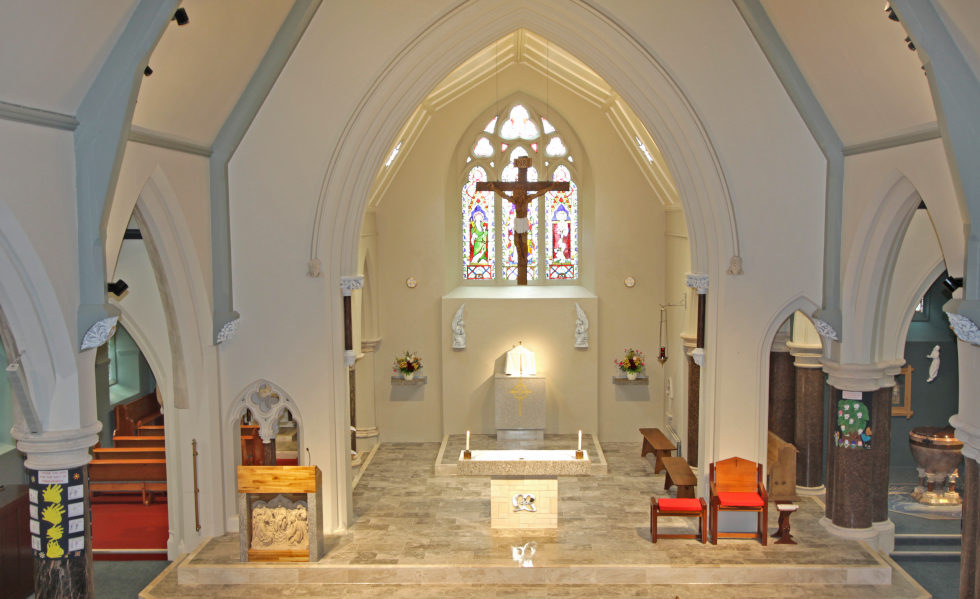Renewing the grace of Holy Baptism
We could do a lot worse than to think of Confession in terms of St. Augustine’s interpretation of the parable of the Good Samaritan. St. Augustine applies the analogy to all the Sacraments, but it works particularly well with Confession. The Jew travelling from Jerusalem to Jericho stands for us – a pilgrim people journeying in a dangerous world towards our heavenly reward. The brigands he falls foul of are our own evil desires, which lie in ambush within us and overpower us with their force, leading us into sin, which leaves our souls battered, wounded and almost dead. The Good Samaritan is Christ who responds to the disaster of sin in which we find ourselves. Christ binds up the injured soul through the Sacrament of Reconciliation, in this case represented by the oil and water with which He tends the wounds, The Sacrament is also represented by the donkey on which he places the Jew because the donkey is the means by which the Samaritan carries the injured Jew to the inn, in our case, the Church, where he can be more fully ministered to through the Sacraments of the Church. The Jew is entrusted to the innkeeper, as the souls of all the faithful are entrusted to the Ministers of the Church. To assist them, the Samaritan gives the Innkeeper sufficient money to enable the innkeeper to begin the healing of the Jew, and promises to return and pay any outstanding debt. In the same way, having entrusted the Sacraments to the Church as the means of encouraging the growth of the soul in holiness, Christ promises to return at the end of time to complete what the Sacraments prefigure and initiate but are still to be fulfilled in the Kingdom.
I find this analogy helpful for a number of reasons:
1. It puts at the centre of the action the person of Christ who is the healer of the soul. We should remember that in Confession we encounter Christ in the person of the Priest. It is Christ who recognises our weakness in sin, Christ who bandages our wounds through Confession and Christ who gives us advice in the moral and spiritual life to help us avoid the occasion and temptations of sin. We are not simply talking to another human being.
2. It places Confession within the context of the whole of Christ’s ministry of reconciling mankind with God. It is too easy to see Confession as a kind of “holy time-out” when we step back from our lives, repent for a moment and then plunge back in again. Confession and reconciliation with God is an on-going part of our Christian lives, which we are reminded of when the Church repeats to us Christ’s call for us to do penance and to repent.
3. Finally, this analogy presupposes that God is not just willing to receive our repentance, he is actually the cause of it – he leads us to Confession, gives us the desire to seek God’s grace, and gives us the spiritual insight to turn away from our sin. We should beware of seeing Confession as our way of persuading God to be merciful to us. Quite the contrary, the fact that Christ instituted Sacramental Confession within the Church is a powerful demonstration that God urgently desires the reconciliation of all peoples, even to the extent of providing the human means of such reconciliation. The Catechism is adamant that when we come to Confession, we are drawn and invited there by God who is already at work within us, leading us to want and choose reconciliation with God (C.C.C. 1426-1428, 1432, 1484, 1489).Confession from beginning to end is primarily a work of God; man’s contribution is simply to acknowledge the need for God’s mercy!
We should never be afraid to come to the Lord in Confession – it is the forum he has specifically designed to welcome us to the fullness of his love, and to restore us to the full communion of his holy People. No Catholic has any reason to suffer the burdens of guilt (the famous so-called “Catholic guilt-complex”) because we are the only ones to teach and believe that Christ absolves our guilt in the here and now through the medium of the Church.
An extract from The Faith of the Catholic Church by Fr Guy de Gaynesford
Click on this link for the relevant pages from the Catechism of the Catholic Church:
